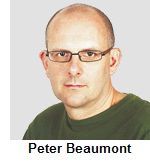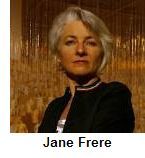![]() In the wake of recent terror attacks in Jerusalem, the status of the city’s Palestinian residents has come under the spotlight. The Observer’s headline “Arabs under siege as Israel tightens grip on Holy City” is indicative of the slanted nature of Peter Beaumont’s article. The term “under siege” itself is sensationalist, bearing no connection to reality.
In the wake of recent terror attacks in Jerusalem, the status of the city’s Palestinian residents has come under the spotlight. The Observer’s headline “Arabs under siege as Israel tightens grip on Holy City” is indicative of the slanted nature of Peter Beaumont’s article. The term “under siege” itself is sensationalist, bearing no connection to reality.
Using terms such as “Arab East Jerusalem” and “Jewish West Jerusalem”, Beaumont implies that eastern Jerusalem is inherently “Arab” while west Jerusalem is “Jewish”. However, the only time that the eastern part of Jerusalem was exclusively Arab was between 1949 and 1967, and that was because Jordan occupied the area and forcibly expelled all the Jews. Beaumont’s entire premise ignores legitimate Jewish rights to Jerusalem as its capital for over 3000 years and the central role that the city plays in Jewish existence.
Beaumont begins his article by focusing on the story of the al-Kurd family home, stating that an eviction notice had been served. Irrespective of the rights or wrongs of the case, Beaumont failed to include the important information that the al-Kurd family is awaiting an Israeli High Court ruling on the eviction and omitted further background on the legal battle that has gone on for the past 10 years. Instead, Beaumont subjectively sums up the entire case as an “arcane legal claim.”
We also wonder how Beaumont is able to justify his claim that “Arab East Jerusalem will have shrunk perceptibly once more” in the face of statistical evidence that the growth rate of the Arab population in Jerusalem is almost double the growth rate of the Jewish population. 
Beaumont refers to the “beleaguered Arab quarter of the Old City”, concentrating on supposed overcrowding in the area. However, he ignores the obvious – with a high birth rate in such a small area, Arab residents are bound to be living in crowded conditions, something that also applies to the Jewish ultra-Orthodox population.
In addition, Beaumont does not acknowledge the primary reasons that Palestinians are so intent on residency within Jerusalem:
Immediately following Israel’s reunification of Jerusalem in 1967, Jerusalem’s Arab residents were offered full Israeli citizenship, though most declined to accept it.
Nevertheless, those who chose not to accept Israeli citizenship, retain the right, as residents of the city, to participate in municipal elections and enjoy all economic, cultural and social benefits afforded to Israeli citizens such as Israel’s health funds, social security services, and membership in Israel’s Labour Federation. Just as importantly, Jerusalem’s Arab residents enjoy freedom of movement within Israel, something that is not afforded to Palestinians in the West Bank.
In fact, talk of dividing Jerusalem has only increased the number of the city’s Palestinians applying for Israeli citizenship. This is testament to the benefits granted upon the Arab residents of the Jerusalem by Israel and the fears of many Palestinians who are adamantly opposed to any handover of the city to the Palestinian Authority.
The status of Jerusalem in any negotiations between Israel and the Palestinians is a complex and emotive issue. Peter Beaumont has presented a wholly partial and one-sided account. Please send your considered comments to The Observer – [email protected]
ARTIST’S CREATIVE NARRATIVE 
Writing in The Scotsman, artist Jane Frere explains the background to her new exhibition in an long anti-Israel propaganda piece.
She begins by describing an alleged shooting of a Palestinian youth by an Israeli tank in Bethlehem that she had heard from a Palestinian woman. The woman, however, we later learn is not an eyewitness but relies on her son: “We were shopping, then my son came dashing up to me – ‘Don’t go into the square, Mum, they just shot a boy.'” So much for ‘reliable Palestinian eyewitnesses.’
Frere talks of a “dwindling tourist trade” in Bethlehem where “such tourists comprise only the most dedicated of pilgrims, bold enough to venture beyond the 8m-high towering wall, through hostile check points”. This, despite articles from as recently as December 2007 pointing to a dramatic increase in tourists during the year, aided by Israeli efforts to facilitate movement through Bethlehem’s checkpoint.
By referencing her visit to the Majdenek Nazi concentration camp as a source of inspiration for her exhibition, Frere deliberately invites the false and insulting comparisons between the Nazi treatment of the Jews and Israeli treatment of the Palestinians. Indeed, Frere ponders “how that blue and white [Israeli] flag has become so blood-drenched since its creation. I began to wonder about the next stage in the tragic history of that period – the creation of Israel and its consequences.”
Frere certainly does her best to recreate the impression of a Nazi-style state, accusing Israel of deliberately targeting Palestinian children:
The Israeli military make regular incursions in their tanks or Humvees, creeping into darkened crevices like giant steel insects, waiting to “take out” those they consider a threat to security. It could be a teenage boy, a young girl (700 children were held by the army in 2007, including three girls), or someone’s father or brother. People can disappear for months without trial, and not return for years.
Of course, while painting Israel in such sinister terms, nowhere does Frere acknowledge Palestinian terrorism or legitimate Israeli security concerns. She also mentions the 1982 massacre of Palestinians in Lebanon’s Shatila refugee camp but ensures that anyone unfamiliar with the event will automatically assume that Israel carried out the slaughter rather than the Lebanese Christian Phalangist militia.
We are left in no doubt as to Frere’s historical revisionism as she claims that Israel’s creation “required a deliberate strategy to rid the land of as many of its indigenous population as possible, through a process of violence and terror.” Frere backs this up by mentioning historians Ilan Pappe and Benny Morris. Pappe, with whom Frere appeared on a panel at the Edinburgh International Book Festival, is a prominent anti-Zionist renowned for his lack of historical objectivity while Benny Morris actually maintains that there was no Zionist “plan” or blanket policy of evicting the Arab population.
Jane Frere’s extremely lengthy screed deserves a response. Please write to The Scotsman by clicking here – http://members.scotsman.com/contact.cfm

